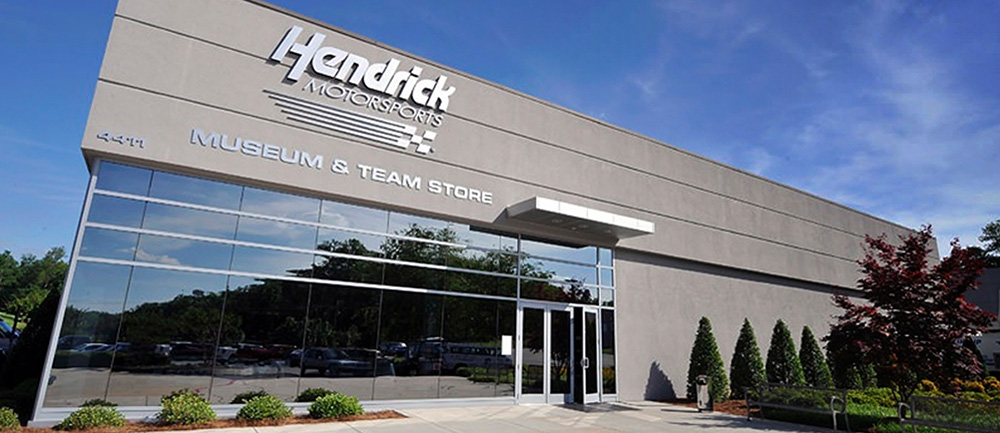
CONCORD, N.C. –- For the first time in his career, Jeff Gordon hopped into an iRacing rig and took to the virtual track for the eNASCAR iRacing Pro Invitational Series at Talladega on Sunday. The four-time Cup Series champion placed 38th in the race, but he was impressed with how realistic the simulation is.
“It was awesome,” Gordon said. “Obviously, my race didn’t go very well, so I’d like to have a do-over on that. We’ve been broadcasting these races and interacting and hearing the drivers - it was great to experience it from that side.”
When the eNASCAR iRacing Pro Invitational Series started in March, Gordon said there was no way he would participate. As time went on and it became clear that racing at a live track would be on hold for a period of time, Gordon said in the FOX studios that he’d consider racing at Talladega. It snowballed from there and Gordon started to prepare, even whipping out the Axalta/Pepsi scheme from his win at Talladega in 2004.
Before Sunday’s race, Gordon had no iRacing experience. His first time in the rig was a practice session a couple of days earlier, where he said he didn’t fare much better than the actual race. Teammate William Byron was helpful in teaching Gordon the basics.
“How do you not go to William when you’re going to go iRacing with how successful he’s been at it?” he said.
Byron told Gordon how to use the equipment, the best way to cruise into pit road and how to optimize the camera angles. Gordon also needed to get used to hearing multiple voices in his headset as opposed to just a crew chief.
“I’m hearing Denny Hamlin, Dale Earnhardt Jr., Clint Bowyer and all these others who were on there,” Gordon said. “To me, that comradery and getting out there with that group of drivers, that was so much fun. I totally see the appeal to iRacing because it’s more than driving a vehicle. It’s more than just realistic virtual racing. It’s also a way to interact and socialize with other people.”
Gordon did have a brief shining moment during Sunday’s race. He and Hendrick Motorsports teammate Chase Elliott were able to push their way to the front and ride in the top 10 for several laps. Gordon said that was the “highlight” of the race for him. Unfortunately, the moment didn’t last long and both Gordon and Elliott were caught up in an accident.
Even though he had fun, don’t expect Gordon to become a professional iRacing driver. He made an exception for Talladega but he likely won’t be hitting the virtual track again.
“I’m not doing any more,” he said. “If they go back to Talladega or Daytona, maybe. I guess Michigan could possibly be an option, but any other than those I’m going to be in the booth.”
Other aspects of the simulation took Gordon by surprise, such as having to rely on mostly visuals instead of feeling the sensations of the car. He had to adjust to the different depth perception of the other vehicles around him and learn how the simulated car would react in certain situations.
“Other than the risk factor of being out there on the track in a real car, I think iRacing is harder,” he said. “In the real world you have the engine vibrations, the drive shaft, the tires connected to the road. All your senses affect you through the seat of your pants and into your arms and through the g-force. All of these things are telling your body what the car is doing and where the limits of it are.”
Difficulties aside, it was important for Gordon to give back as part of his return to the track. Through his charity, the Jeff Gordon Children’s Foundation, he said there would be a donation of $24 per lap he ran. He encouraged fans to sponsor a lap, as well, to aid children battling cancer.
“Through all of the COVID-19 and how this has affected people, this is what cancer patients, especially kids are going through all the time. This is their life. They have to wear a mask and gloves and sometimes be quarantined, depending on what stage they’re in or what treatment they’re receiving,” Gordon said.
“No matter what crisis the world is going through, people recognize there are other causes out there that can help save lives. I’m so fortunate we have our foundation and that we had that opportunity.”
With the uncertainty in the world, Gordon is encouraging people to see what’s important in life. He said when it is time to head back to the racetrack, it will be much more than an escape for fans and the NASCAR community.
“I think we’re fortunate in racing to have something that we’re very passionate about. I’ve really seen that from the broadcast side and from the Hendrick Motorsports team side,” he said. “If you don’t have that passion to fall back on, everything goes by the wayside. It’s what reminds you of normalcy and what inspires you to balance out life.”







